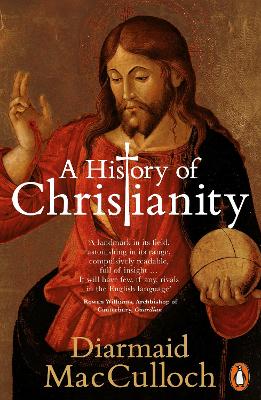Reviewed by jamiereadthis on
I keep coming up with jokes, like, “You know what they say, ‘An atheist is just someone who’s studied their religion.’”
Honestly, this book was really very good. It’s history, which I love, and religious history, which utterly fascinates me with the scale and grandeur of brutality people are willing to inflict on other people in the name of charity and salvation. The whole book— which kept switching from the macro to the micro with expert timing, by the way— I just kept picturing all of this three-thousand-year saga, a hiccup on the evolutionary timescale, playing out from the vast vantage point of elsewhere in our galaxy, where we’re not even a blip of starlight in deep space. And if it didn’t seem petty before, well.
Back down on an earthly scale— or not even that, on a continent’s scale, country by country— the epic and the exhaustive scope of MacCulloch’s research has to be praised. I can’t imagine taking on a scholarship of that magnitude. It’s just bewildering in breadth, and meticulous in detail. All told, though, I much preferred Robert Wright’s The Evolution of God; not because it does the subject more justice, but because it deals with the slightly different angle— the actual evolution of the anthropological and sociological aspects of a religion, as well as what is worshipped within it— that is far more fascinating to me.
For a history of the church, though, you couldn’t do much better than this without devoting your time in semester-sized chunks, and maybe not even then.
Honestly, to hold onto the mystery and conviction of a religion: don’t study its history.
Reading updates
- Started reading
- 8 January, 2011: Finished reading
- 8 January, 2011: Reviewed
